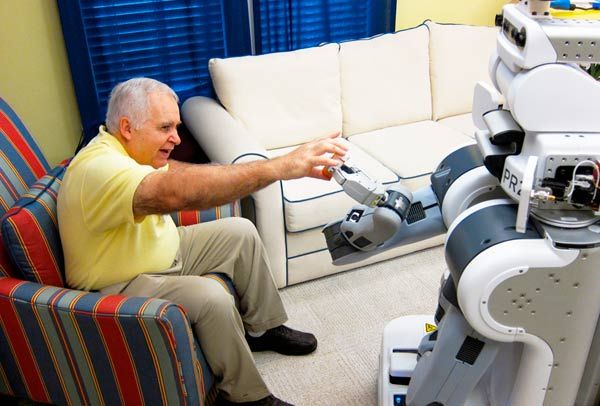
All iLive content is medically reviewed or fact checked to ensure as much factual accuracy as possible.
We have strict sourcing guidelines and only link to reputable media sites, academic research institutions and, whenever possible, medically peer reviewed studies. Note that the numbers in parentheses ([1], [2], etc.) are clickable links to these studies.
If you feel that any of our content is inaccurate, out-of-date, or otherwise questionable, please select it and press Ctrl + Enter.
The care of the elderly will be entrusted to robots
Last reviewed: 02.07.2025
Special robotic machines with artificial intelligence will soon help care for bedridden elderly people.
This is the information that was published by researchers from the English universities of Middlesex and Bedfordshire. “Robot services for caring for elderly patients who are unable to get out of bed on their own will be one of the most anticipated moments for social service workers.”
Among other things, this innovation will significantly reduce the workload of personnel providing such assistance in institutions for the disabled and elderly, in hospitals and clinics.
Presumably, the “smart robots” will be trained to be polite and have good manners. They will be able to perform almost any task aimed at helping the elderly with their daily needs – from morning washing and taking medications to more complex manipulations.
According to experts, robotic assistance will be developed over the next three years. Many EU countries, as well as the Japanese government, have already announced funding for such a program.
Today, similar robots – albeit with a relatively simplified program – perform simple tasks in Japanese hospitals. For example, they successfully distribute food to patients, and are also used to lift bedridden patients for washing and changing clothes.
Dr. Irene Papadopoulos, an expert in transcultural patient care, is confident: “This kind of innovation would be very useful right now. Since the number of elderly people is growing every year, health authorities are no longer able to cope with the new workload.” Robotic assistants with intelligence will significantly facilitate the implementation of various procedures and manipulations, and will also make the provision of medical care more qualitative.
Over time, if there is a demand for such inventions, robots will be able to care for the elderly at home: this approach will make the lives of elderly patients more comfortable and independent.
Experts say that the said introduction of new technologies cannot be considered a replacement for a person. It is only an improvement and simplification of the existing system of assistance, despite the fact that robots will be able to communicate using individual phrases and gestures. In addition, machines will have the ability to evaluate and analyze the information they see in order to understand from certain symptoms what a sick person feels, what hurts, etc.

All of the above information pertains to robots called "Pepper" - they were developed by Softbank Robotics and have been successfully used by thousands of people in Japan for several years.
One of the company's leaders, Chief Scientist Amit Humar Pandey explains that the scientists representing Softbank Robotics dream of creating a society in which robots and people will coexist and help each other, making the world happier, healthier and more harmonious.

 [
[